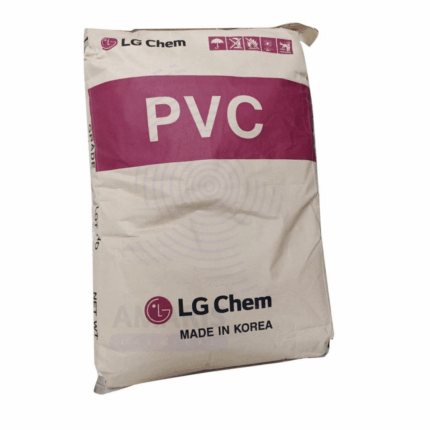PVC Masterbatch
PVC Masterbatch is a concentrated mixture of pigments, additives, or fillers encapsulated in a PVC carrier resin, designed for direct addition into PVC processing applications. It offers an efficient and dust-free way to color, modify, or enhance the physical properties of PVC products. This masterbatch ensures excellent dispersion, consistent coloration, and improved processability. It is widely used in rigid and flexible PVC applications including construction, automotive, packaging, electrical, and consumer products.
Primary Uses
PVC Pipe and Fitting Industry
Used to color and stabilize rigid PVC pipes for water supply, drainage, and cable conduit systems.
Enhances UV resistance and impact strength of outdoor PVC products.
Construction Materials
Applied in window and door profiles, cladding, roofing sheets, and wall panels for coloration and weather resistance.
Improves surface finish, gloss, and appearance of finished profiles.
Wires and Cables
Incorporated in PVC sheathing and insulation to provide color coding, flame retardancy, and thermal resistance.
Flexible PVC Applications
Used in hosepipes, floorings, synthetic leather, and films for pigmentation and softness control.
Enhances printability and surface aesthetics in calendared sheets and flooring tiles.
Packaging Industry
Used in PVC blister packs, bottles, and rigid containers to achieve uniform color and improved mechanical properties.
Automotive Applications
Applied in dashboards, interior trims, mats, and door panels for color uniformity and UV stability.
Secondary Uses
Footwear Industry
Used in PVC shoe soles and uppers to provide consistent coloration and durability.
Medical Devices (Non-critical)
Applied in coloring tubing, fluid bags, and device housings made of flexible PVC (non-implantable, non-critical use).
Toys and Stationery
Used to impart safe, vivid colors to toys, erasers, and school supplies made from PVC.
Consumer Goods
Applied in buckets, basins, furniture components, and other molded household items.
Advertising and Display Materials
Used in signage boards, POP displays, and banner films for vivid, consistent color and weather resistance.
Basic Identification Attributes
Chemical Name (IUPAC): Blend of poly(chloroethene) and pigment/additive systems
Common/Trade Name: PVC Masterbatch
CAS Number: Mixture (main polymer: 9002-86-2)
HS Code: 3206.49.00 (Coloring matter and preparations based on polymers)
Synonyms: PVC color concentrate; Pigmented PVC compound
Physical & Chemical Properties
Physical State: Granules or pellets
Color & Odor: Varies by formulation; usually odorless
Carrier Resin: PVC-compatible polymer or plastisol
Melting/Processing Point: Typically processed at 150–200 °C
Solubility: Insoluble in water; dispersible in PVC matrices
Density: 1.2–1.5 g/cm³ depending on formulation
Safety & Hazard Attributes
GHS Classification: Non-hazardous in solid form; hazardous if thermally decomposed
Toxicity: Low toxicity; safe when used as directed
Exposure Limits: Follow workplace exposure guidelines for dust during handling
Storage & Handling Attributes
Storage Conditions: Store in a dry, cool place away from direct sunlight and heat sources
Container Type: Polyethylene bags (typically 25 kg), drums, or bulk bins
Shelf Life: 12–24 months under recommended storage conditions
Handling Precautions: Minimize dust generation; use local exhaust ventilation during processing
Regulatory & Compliance Attributes
May comply with RoHS, REACH, and FDA standards based on pigment and additive selection
Suitable for use in food packaging or medical applications if specifically formulated and certified
Manufactured in ISO 9001 or GMP-certified facilities
Environmental & Health Impact
Biodegradability: Not biodegradable; inert in landfill conditions
Ecotoxicity: Low if handled properly; avoid uncontrolled release
Bioaccumulation: Not expected
PPE Required: Gloves, dust mask, safety glasses recommended
Handling Guidelines: Avoid breathing dust or fumes; use in well-ventilated areas
Storage Measures: Keep containers tightly closed and stored in a dry environment
First Aid Measures
Inhalation: Move to fresh air; seek medical help if symptoms persist
Skin Contact: Wash with soap and water; get medical attention if irritation occurs
Eye Contact: Flush with water for 15 minutes; seek medical attention if irritation continues
Ingestion: Rinse mouth; do not induce vomiting; consult a physician
Firefighting Measures
Fire Hazards: Combustible at elevated temperatures; may emit toxic fumes
Extinguishing Media: Water spray, foam, dry chemical, or CO₂
Special Precautions: Use full protective gear and self-contained breathing apparatus
Hazardous Combustion Products: Hydrogen chloride gas, carbon oxides, and other toxic compounds


 Preservatives(food)
Preservatives(food) Flavor Enhancers
Flavor Enhancers Acidulants
Acidulants Sweeteners
Sweeteners Antioxidants
Antioxidants Colorants(food)
Colorants(food) Nutraceutical Ingredients (food)
Nutraceutical Ingredients (food) Nutrient Supplements
Nutrient Supplements Emulsifiers
Emulsifiers
 Collectors
Collectors Dust Suppressants
Dust Suppressants Explosives and Blasting Agents
Explosives and Blasting Agents Flocculants and Coagulants
Flocculants and Coagulants Frothers
Frothers Leaching Agents
Leaching Agents pH Modifiers
pH Modifiers Precious Metal Extraction Agents
Precious Metal Extraction Agents
 Antioxidants(plastic)
Antioxidants(plastic) Colorants (Pigments, Dyes)
Colorants (Pigments, Dyes) Fillers and Reinforcements
Fillers and Reinforcements Flame Retardants
Flame Retardants Monomers
Monomers Plasticizers
Plasticizers Polymerization Initiators
Polymerization Initiators Stabilizers (UV, Heat)
Stabilizers (UV, Heat)
 Antifoaming Agents
Antifoaming Agents Chelating Agents
Chelating Agents Coagulants and Flocculants
Coagulants and Flocculants Corrosion Inhibitors
Corrosion Inhibitors Disinfectants and Biocides
Disinfectants and Biocides Oxidizing Agents
Oxidizing Agents pH Adjusters
pH Adjusters Scale Inhibitors( water)
Scale Inhibitors( water)
 Antioxidants(cosmetic)
Antioxidants(cosmetic) Emollients
Emollients Fragrances and Essential Oils
Fragrances and Essential Oils Humectants
Humectants Preservatives
Preservatives Surfactants(cosmetic)
Surfactants(cosmetic) Thickeners
Thickeners UV Filters
UV Filters
 Fertilizers
Fertilizers Soil Conditioners
Soil Conditioners Plant Growth Regulators
Plant Growth Regulators Animal Feed Additives
Animal Feed Additives Biostimulants
Biostimulants Pesticides (Herbicides, Insecticides, Fungicides)
Pesticides (Herbicides, Insecticides, Fungicides)
 Active Pharmaceutical Ingredients (APIs)
Active Pharmaceutical Ingredients (APIs) Excipients
Excipients Solvents(pharmaceutical)
Solvents(pharmaceutical) Antibiotics
Antibiotics Antiseptics and Disinfectants
Antiseptics and Disinfectants Vaccine Adjuvants
Vaccine Adjuvants Nutraceutical Ingredients (pharmaceutical)
Nutraceutical Ingredients (pharmaceutical) Analgesics & Antipyretics
Analgesics & Antipyretics
 Analytical Reagents
Analytical Reagents Solvents(lab)
Solvents(lab) Chromatography Chemicals
Chromatography Chemicals Spectroscopy Reagents
Spectroscopy Reagents microbiology-and-cell-culture-reagents
microbiology-and-cell-culture-reagents Molecular Biology Reagents
Molecular Biology Reagents Biochemical Reagents
Biochemical Reagents Inorganic and Organic Standards
Inorganic and Organic Standards Laboratory Safety Chemicals
Laboratory Safety Chemicals Specialty Laboratory Chemicals(Special Laboratory Equipment)
Specialty Laboratory Chemicals(Special Laboratory Equipment)
 Demulsifiers
Demulsifiers Hydraulic Fracturing Fluids
Hydraulic Fracturing Fluids Scale Inhibitors(oil)
Scale Inhibitors(oil) Surfactants(oil)
Surfactants(oil) Drilling Fluids
Drilling Fluids
 Dyes and Pigments
Dyes and Pigments Bleaching Agents
Bleaching Agents Softening Agents
Softening Agents Finishing Agents
Finishing Agents Antistatic Agents
Antistatic Agents
 Admixtures
Admixtures Waterproofing Agents
Waterproofing Agents Sealants and Adhesives
Sealants and Adhesives Curing Compounds
Curing Compounds Concrete Repair Chemicals
Concrete Repair Chemicals Anti-Corrosion Coatings
Anti-Corrosion Coatings
 Surfactants(cleaning)
Surfactants(cleaning) Builders
Builders Enzymes
Enzymes Solvents (Cleaning)
Solvents (Cleaning) Fragrances
Fragrances
 Electronic Chemicals
Electronic Chemicals Catalysts
Catalysts Lubricants
Lubricants Photographic Chemicals
Photographic Chemicals Refrigerants
Refrigerants Automotive chemicals
Automotive chemicals Pyrotechnic Chemicals
Pyrotechnic Chemicals
 Biodegradable Surfactants
Biodegradable Surfactants Bio-based Solvents
Bio-based Solvents Renewable Polymers
Renewable Polymers Carbon Capture Chemicals
Carbon Capture Chemicals Wastewater Treatment Chemicals
Wastewater Treatment Chemicals
 Pigments
Pigments Solvents(paint)
Solvents(paint) Specialty Coatings
Specialty Coatings Binders/Resins
Binders/Resins Additives
Additives Driers
Driers Anti-Corrosion Agents
Anti-Corrosion Agents Functional Coatings
Functional Coatings Application-Specific Coatings
Application-Specific Coatings
 Fresh Herbs
Fresh Herbs Ground Spices
Ground Spices Whole Spices
Whole Spices Spice Blends
Spice Blends Dried Herbs
Dried Herbs
 Leavening Agents
Leavening Agents Dough Conditioners
Dough Conditioners Flour Treatments
Flour Treatments Fat Replacers
Fat Replacers Decoratives
Decoratives Preservatives(baking)
Preservatives(baking)
 Plasticizers & Softeners
Plasticizers & Softeners Reinforcing Agents
Reinforcing Agents Adhesion Promoters
Adhesion Promoters Vulcanizing Agents
Vulcanizing Agents Antidegradants
Antidegradants Blowing Agents
Blowing Agents Fillers & Extenders
Fillers & Extenders Accelerators & Retarders
Accelerators & Retarders





















